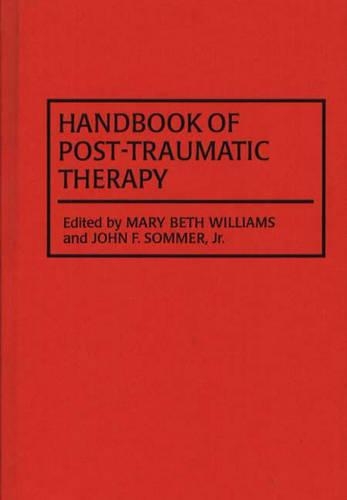
Handbook of Post-Traumatic Therapy
(Hardback)
Publishing Details
Handbook of Post-Traumatic Therapy
By (Author) John F. Sommer
By (author) Marybeth Williams
Bloomsbury Publishing PLC
Greenwood Press
30th September 1994
United States
Classifications
Tertiary Education
Non Fiction
Neurology and clinical neurophysiology
Psychiatry
Social work
616.85210651
Physical Properties
Hardback
656
Description
This handbook provides both a conceptual and practical framework for diagnosing, treating and assessing post-traumatic stress in survivors of violence, abuse, war, ethnocultural problems, political torture and disaster. The in-depth clinical experience of Williams and Sommer helps define a variety of theories and methods for treating children, adults, families and other groups with various types of post-traumatic stress disorders. They point out specific new kinds of therapies and types of interventions, and discuss new developments and trends for the treatment of post-traumatic stress. This reference volume, with its lengthy bibliography, is designed for students, teachers and practitioners in the fields of psychology and psychiatry, social work, medicine and public health.
Reviews
[An] excellent handbook that provides a comprehensive and in-depth look at PTSD. Williams and Sommer create a conceptual framework for diagnosing, treating, and assessing post-traumative stress in survivors of violence, abuse, war, political torture, and disaster. Chapters are devoted to creative therapies, group interventions, and several new trends. * Choice *
[T]he usefulness of the book is immediately obvious because of the comprehensiveness of the topics covered, and the wealth of accumulated experience and knowledge of the contributing authors. The book should be read by anyone interested in or practicing in the field of psychological trauma or traumatic stress recovery. . . . The impact of the book upon the field of traumatology will be one of educational value. That is, there are now volumes of theories, hypotheses, research, and opinions about the causes and treatment of post-traumatic stress, but few works which include the vast accumulation of practical experience and knowledge gathered in this book. It provides an opportunity for the many isolated practitioners to compare their knowledge and techniques with those of the experts in the field, and then decide what methods may be most effective in the treatment of their trauma survivors. * JTS *
[An] excellent handbook that provides a comprehensive and in-depth look at PTSD. Williams and Sommer create a conceptual framework for diagnosing, treating, and assessing post-traumatic stress in survivors of violence, abuse, war, political torture, and disaster. * Choice *
Author Bio
Mary Beth Williams is a private practitioner in the Trauma Recovery Education and Counseling Center in Warrento, Virginia, and a school social worker in Falls Church, Virginia. She has conducted research with sexual abuse survivors, and received her PhD in human and organizational systems development from the Fielding Institute in Santa Barbara, California. Her recent publications include Violence Hits Home: A Sourcebook on Treatment of Family Violence (1990) and many professional journal articles on post-traumatic stress disorders. John F. Sommer, Jr. is executive director of the Washington, D.C. Office of The American Legion. He has co-authored articles and facilitated research projects dealing with Agent Orange effects on Vietnam Veterans. He has been involved in ongoing POW/MIA investigations, has testified before Congressional Committees, and has made three recent trips to Vietnam and other areas of Southeast Asia. He is a member of the International Society for Traumatic Stress Studies, and is co-chair of the Ethics Task Force/Committee of ISTSS. He has presented nationally on a variety of trauma-related topics. Mr. Sommer served in the U.S. Army in Vietnam as a combat medic, and Noncommissioned Officer in Charge of a Battalion Station. He currently chairs the Department of Veterans Affairs Advisory Committee on the Readjustment of Vietnam and Other War Veterans.
